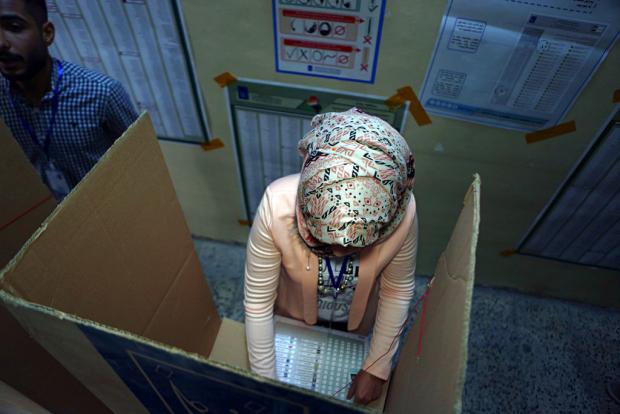Iraqi polls open in first elections since victory over IS

An Iraqi woman casts her vote in the country’s parliamentary elections in Baghdad, Iraq, Saturday, May 12, 2018. Polls opened across Iraq on Saturday in the first national election since the declaration of victory over the Islamic State group. (Photo by KHALID MOHAMMED / AP)
BAGHDAD — Polls opened across Iraq on Saturday in the first national election since the declaration of victory over the Islamic State group. After hours of low voter turnout, Iraqi Prime Minister Haider al-Abadi partially lifted a security curfew to encourage more people to come to the polls.
After weeks of official campaigning, no clear front-runner has emerged as al-Abadi faces stiff competition from political parties with closer ties to Iran.
The announcement from al-Abadi’s office that a ban on civilian cars and buses in all provinces was partially lifted came after hours of relatively low turnout in Baghdad. The curfew had been in place since midnight the night before and many voters complained of having to walk more than 4 kilometers (2.5 miles) to reach polling stations.
In central Baghdad, voters supporting al-Abadi said they are doing so because they give him credit for Iraq’s military victory over IS.
Al-Abadi “took revenge” for civilians killed in insurgent attacks in Iraq “with the victory over Daesh,” said 71-year-old Felihah Hassan, using the Arabic acronym for IS.
Article continues after this advertisementAfter IS overran nearly a third of Iraq in the summer of 2014, the group launched waves of suicide bombings targeting civilians in Baghdad and other pockets of government-controlled territory.
Article continues after this advertisementWith support from the US-led coalition and Iran, al-Abadi oversaw a grueling war against the extremists and declared victory over the group in December.
Since then, Baghdad has experienced a relative lull in insurgent-style attacks, but in the lead up to Saturday’s vote Iraqi security forces have imposed tight security measures.
Despite al-Abadi’s military achievements, Iraq continues to struggle with an economic downturn sparked in part by a drop in global oil prices, entrenched corruption and years of political gridlock.
The prime minister’s most powerful opponents are his predecessor, Nouri al-Maliki, and an alliance of candidates with close ties to the country’s powerful, mostly Shiite paramilitary forces.
The alliance, called “Fatah” – Arabic for “Conquest” – is headed by Hadi al-Amiri, a former minister of transport who became a senior commander of paramilitary fighters in the fight against the IS group. Many of the candidates on his list were also paramilitary commanders before they cut their official ties with the force in order to seek office.
Jassim Mohsen, 58, who fought against IS with the paramilitary forces, said he’s casting his vote for the alliance because of their personal sacrifices.
“I elected the Fatah list because they are the only ones who fought Daesh and gave blood,” he said.
Another key player in the vote is Influential cleric Muqtada al-Sadr. He commanded fighters in the war against IS and headed a powerful militia that fought US forces in Iraq before that, but his election campaign has focused on social issues and eliminating government corruption.
Some Sunnis voting Saturday said they are hopeful this election will help Iraq move beyond sectarian politics and become more inclusive.
Marginalization of Iraq’s Sunnis under al-Maliki is seen as a factor that allowed IS to rise in power in Iraq. Al-Abadi has led a more cross-sectarian government marked by his ability to balance the interests of his two allies often at odds: the US and Iran.
The war left more than 2 million Iraqis, mostly Sunnis, displaced from their homes, with cities, towns and villages suffering heavy destruction. Repairing infrastructure across Anbar and Nineveh provinces, both majority Sunni areas, will cost tens of billions of dollars, local officials say.
Abdulrazaq Kubi and his wife Suheila Mahdi, both Sunnis from Baghdad, said they would not be voting for al-Abadi, casting their votes instead for a Sunni-led political alliance.
“The victory is not 100 percent, there is still Daesh here,” said Mahdi. The government “is neglecting the refugees because they are Sunni. They left them in the camps, in the winter it floods, in the summers, they go hungry,” she added.
In total there are 329 parliament seats at stake, with nearly 7,000 candidates from dozens of political alliances.
The vote will be conducted electronically for the first time in an effort to reduce fraud and polling centers have been set up for many of the country’s 2 million people who remain displaced by the war against IS.
The results of Saturday’s election are expected within 48 hours of the vote, according to the independent body overseeing the election.
Government formation negotiations are expected to drag on for months after that as the dozens of political parties attempt to cobble together a political bloc large enough to hold a majority of seats in parliament.